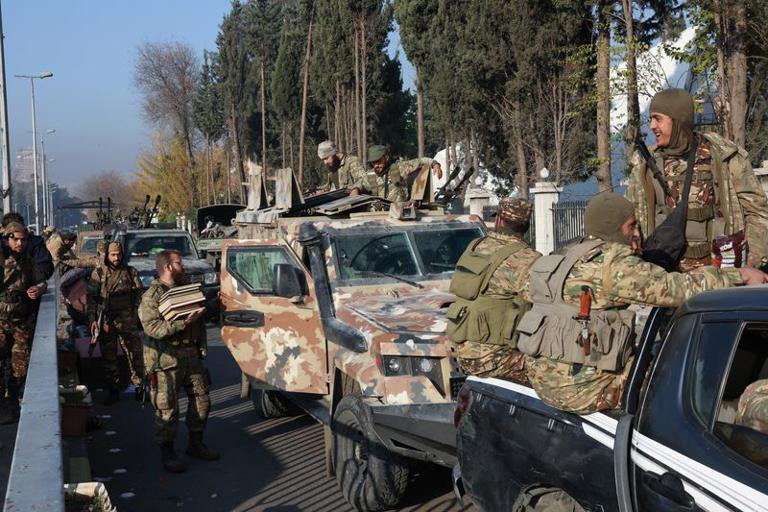
Hezbollah sees ‘major, dangerous’ change in Syria
Lebanon’s Hezbollah views events in Syria as a “major, dangerous and new transformation”, a senior Hezbollah politician has said, in what is the Iran-backed group’s first reaction to the toppling of its ally Bashar al-Assad.
Hezbollah played a major part propping up Mr Assad through years of war in Syria, before bringing its fighters back to Lebanon over the last year to fight in a bruising war with Israel – a redeployment which weakened Syrian government lines.
His downfall has stripped Hezbollah of a vital ally along Lebanon’s eastern border. Assad-ruled Syria long served as a vital conduit for Iran to supply weapons to Hezbollah.
“What is happening in Syria is a major, dangerous and new transformation, and how and why what happened requires an evaluation, and the evaluation is not done on the podiums,” Hezbollah’s Hassan Fadlallah said in a statement.
Syrian armed groups led by the Sunni Islamist Hayat Tahriral-Sham (HTS) swept into Damascus yesterday, seizing the capital and forcing Mr Assad to leave for Russia.
Israel dealt heavy blows to Hezbollah during more than a year of hostilities, which began when the Lebanese group opened fire on 8 October 2023 in solidarity with its Palestinian ally Hamas in Gaza.
A ceasefire in Lebanon took effect on 27 November.
UN rights chief urges accountability, sees huge chance for fair transition
The UN’s human rights chief has called for accountability for perpetrators of abuse under Mr Assad, but said there was a “huge chance” for an inclusive political transition, andthat early signs were promising.
Syrians awoke to a hopeful if uncertain future, after rebels seized the capital Damascus and Mr Assad fled to Russia, following 13 years of civil war and more than 50 years of brutal Assad family rule.
“We will need to make sure that those who are responsible for these violations, be it on the side of the previous government, the president and others, but also all others who are responsible for violations – that they are brought to account,” UN High Commissioner for Human Rights Volker Turk told a Geneva press briefing, calling for meticulous preservation of evidence.
“(Accountability) is going to be a key piece of the transition, because we cannot afford that we go back to those periods where indeed impunity reigns.”
Mr Turk’s office pointed to the disappearance of more than 100,000 people during the war alone, and the use of torture and chemical weapons.
Syria is not currently a member of the International Criminal Court, although a new government could join it. Russia blocked past attempts at the UN Security Council to refer Syria to the court.
Mr Turk said there was a “huge chance” for inclusive dialogue on the political transition in Syria’s new era.
“I hope that within this current environment … there will be this inclusive, very inclusive dialogue,” he said.
“There is a huge chance for this to happen. And what we have seen initially is indeed cooperation,” he added, citing coordination between Mr Assad’s prime minister, Mohammed Jalali, and rebel leader Mohammad al-Jolani.
‘Orderly, peaceful and inclusive transition’ in Syria urged by EU
The European Union has called for a peaceful political transition in war-torn Syria after the ouster of Bashar al-Assad by Islamist-led rebels.
“Now more than ever, it is imperative that all stakeholders engage in an inclusive, Syrian-led and Syrian-owned dialogue on all key issues to ensure an orderly, peaceful and inclusive transition,” the 27-nation bloc said in a statement.
The EU said it was “critical to preserve the territorial integrity of Syria and to respect its independence, its sovereignty, as well as state institutions, and to reject all forms of extremism”.
“We urge all actors to avoid any further violence, to ensure the protection of civilians, and to uphold international law, including international humanitarian law,” the statement said.
It called for the “protection of members of all minorities, including of Christian and other non-majority confessions, as well as the safety of foreign nationals and respect of diplomatic representations in Damascus”.
European Commission chief Ursula von der Leyen held talks with Jordan’s King Abdullah II about the situation on Monday and said she would talk to other regional leaders in the coming days.
Source » rte





